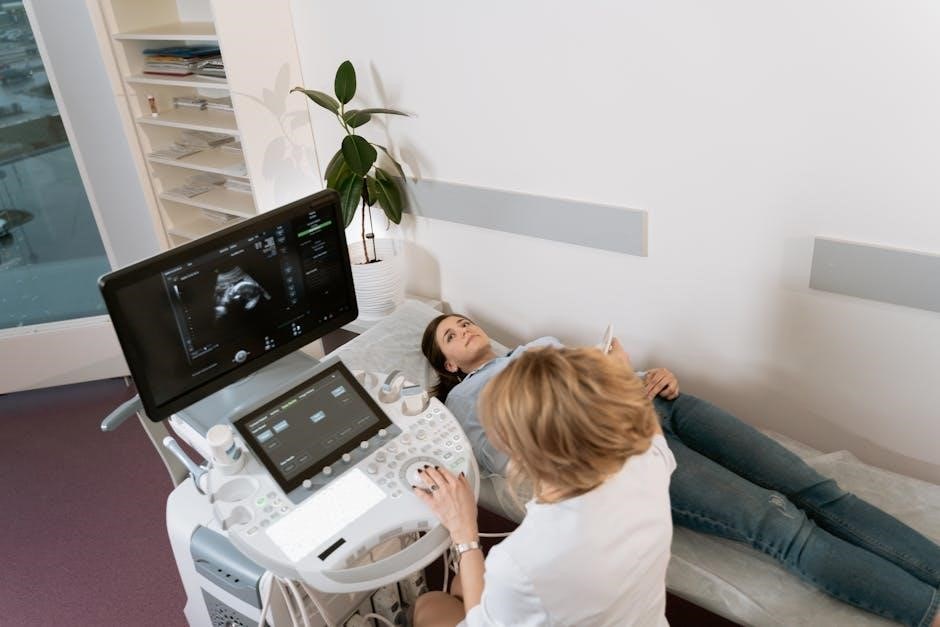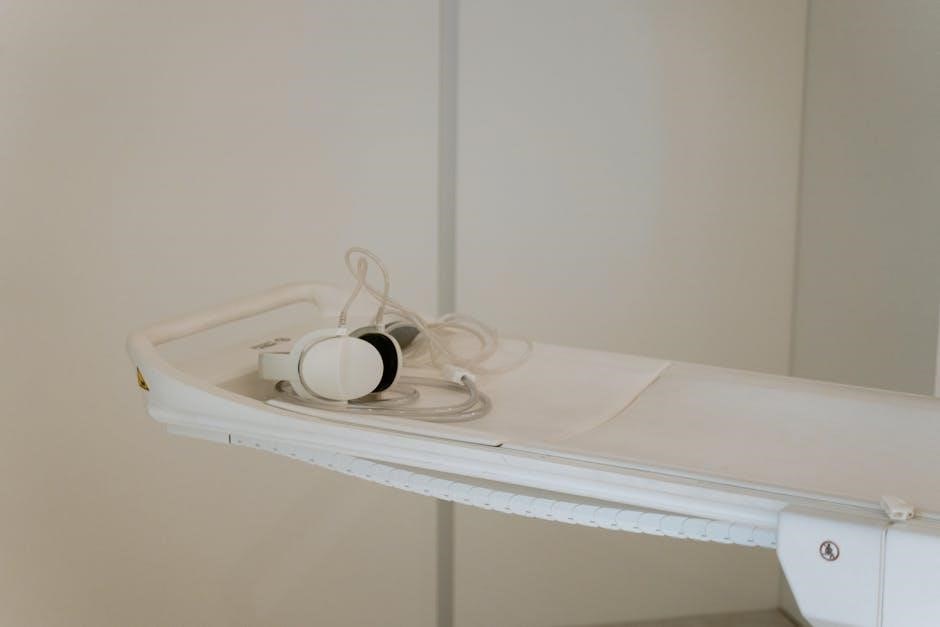The AP U․S․ Government and Politics Exam assesses understanding of U․S․ political institutions, processes, and policies․ Practice tests, including PDF resources, are essential for preparation and success․
1․1 Overview of the Exam Structure
The AP U․S․ Government and Politics Exam consists of two sections: multiple-choice and free-response․ The multiple-choice section includes 60 questions to be answered in 80 minutes, while the free-response section contains 4 questions to be completed in 100 minutes․ Practice tests, such as those available in PDF format, closely mirror this structure, helping students familiarize themselves with the exam format and timing․
1․2 Importance of Practice Tests in Preparation
Practice tests are crucial for AP U․S․ Government exam preparation․ They simulate real exam conditions, helping students manage time effectively and identify knowledge gaps․ Resources like official College Board materials and third-party PDFs provide realistic practice, enabling targeted studying․ Regular use enhances understanding, improves performance, and boosts confidence for the actual test․
Exam Structure and Format
The AP U․S․ Government and Politics Exam includes 60 multiple-choice questions and 4 free-response questions, testing knowledge of government institutions, processes, and policies within a 2-hour 25-minute timeframe․
2․1 Multiple-Choice Section: Timing and Number of Questions
The multiple-choice section consists of 60 questions, timed at 45 minutes․ It assesses knowledge of constitutional principles, political processes, and policy-making․ Practice tests help master timing and question management, ensuring efficient completion and accuracy․
2․2 Free-Response Section: Timing and Question Types
The free-response section lasts 100 minutes and includes 4 questions requiring detailed, evidence-based answers․ Topics cover constitutional principles, political processes, and policy-making․ Practice tests, such as PDF-based resources, help students master question types like argumentation, analysis, and policy evaluation, ensuring they can articulate clear, well-supported responses within the allotted time․

AP Government Practice Test Resources
Official and third-party resources, including downloadable PDFs, provide realistic practice tests, sample questions, and study guides, closely mirroring the actual exam format and content․
3․1 Official Practice Materials from the College Board
The College Board offers official AP U․S․ Government and Politics practice materials, including released exams, sample questions, and scoring guidelines․ These resources closely mimic the actual exam, providing students with realistic practice․ They are available in downloadable PDF formats, allowing easy access and printing․ Using these materials helps students familiarize themselves with the exam structure, question types, and grading criteria, enhancing their preparation and performance․
3․2 Third-Party Study Guides and Question Banks
Beyond official materials, third-party study guides and question banks offer additional practice opportunities․ These include textbooks, online platforms, and PDF resources featuring hundreds of questions․ They provide diverse perspectives and strategies, helping students identify knowledge gaps․ Popular options include comprehensive review books and digital tools with progress tracking, making them valuable supplements to official College Board materials for exam preparation․

Types of Questions on the Practice Tests
Practice tests feature multiple-choice and free-response questions, mirroring the actual exam․ Multiple-choice questions test factual knowledge and application, while free-response questions require analysis, argumentation, and evidence-based responses․
4;1 Multiple-Choice Questions: Focus Areas
Multiple-choice questions on AP Government practice tests cover a broad range of topics, including the Constitution, federalism, political parties, and policy-making․ They test knowledge of key concepts, Supreme Court cases, and political processes․ These questions require critical thinking and application of learned material to select the correct answer․ Practice tests highlight areas needing review and refine test-taking strategies․
4․2 Free-Response Questions: Argumentation and Analysis
Free-response questions on AP Government practice tests require students to demonstrate in-depth analysis and argumentation skills․ These questions often ask for explanations of political concepts, comparisons between institutions, and evaluations of policies․ Proper use of evidence and clear, logical reasoning are essential for high scores․ Practice tests provide examples of such questions, helping students refine their writing and critical thinking abilities․

Scoring Guidelines and Interpretation
Understanding the scoring scale and interpreting practice test results are key to improving performance․ Use official PDF materials for accurate guidelines and sample responses․
5․1 Understanding the Scoring Scale and Grading Criteria
The AP U․S․ Government and Politics Exam is scored on a 1-5 scale, with 5 being the highest․ The scoring reflects mastery of concepts, analysis, and argumentation․ Multiple-choice and free-response sections are weighted equally․ Official PDF materials provide detailed scoring guidelines, sample responses, and distributions to help interpret results and identify areas for improvement․ Understanding these criteria is crucial for effective exam preparation and performance․
5․2 Interpreting Practice Test Results for Improved Performance
Practice test results provide valuable insights into strengths and areas needing improvement․ Analyze your scores to identify weak spots and focus on those topics․ Review incorrect answers and understand the reasoning behind correct ones․ Use scoring guidelines to assess free-response answers and refine argumentation skills․ This targeted approach ensures efficient study and measurable progress toward exam success․

Benefits of Using Practice Tests
Practice tests enhance preparation by improving time management, reducing exam anxiety, and identifying knowledge gaps․ They familiarize students with the exam format and question types, fostering confidence and readiness․
6․1 Enhancing Time Management Skills
Practice tests help students master time management by simulating exam conditions․ They learn to allocate minutes per question, ensuring they complete both multiple-choice and free-response sections efficiently․ Regular practice builds speed and accuracy, reducing stress and improving performance․ Effective time management is crucial for tackling all questions within the allotted 2 hours and 25 minutes․
6․2 Identifying Weaknesses and Strengthening Knowledge Gaps
Practice tests reveal areas where students struggle, allowing targeted focus on improving understanding․ By reviewing mistakes, learners can address gaps in knowledge and refine their study strategies․ Utilizing official and third-party PDF resources, students enhance their grasp of key concepts․ Regular practice strengthens foundational knowledge, ensuring comprehensive preparation for the exam and long-term mastery of government and politics content․
How to Effectively Use Practice Tests
Simulate exam conditions to build stamina and familiarize yourself with the format․ Review mistakes to refine strategies and improve understanding․ Regular practice enhances readiness for the actual test․
7․1 Simulating Exam Conditions for Better Preparation
Timing yourself during practice tests mimics the actual exam experience, helping you manage your pace effectively․ Use official PDF materials to create a realistic environment, ensuring a quiet space and adhering strictly to time limits․ Avoid distractions and treat practice tests as if they were the real exam to build stamina and reduce anxiety, ultimately improving performance on exam day․
7․2 Reviewing and Analyzing Mistakes
After completing practice tests, thoroughly review incorrect answers to identify knowledge gaps․ Use official PDF materials to study scoring guidelines and sample responses․ Analyze error patterns to improve weak areas, ensuring a more focused study approach․ Reflecting on mistakes helps refine strategies and builds confidence for the actual exam, fostering long-term understanding and better performance․

Digital vs․ Printable Practice Tests
Digital practice tests offer interactive features and instant scoring, while printable PDFs provide flexibility for offline study․ Both formats help students prepare effectively for the AP exam․
8․1 Advantages of Online Practice Tests
Online practice tests offer real-time scoring, detailed feedback, and interactive tools, enhancing learning efficiency․ They simulate exam conditions, helping students adapt to time constraints and question formats․ Accessible anytime, they provide flexibility for self-paced study․ Many platforms track progress, identifying weak areas for targeted improvement, making them a valuable resource for AP exam preparation․
8․2 Benefits of PDF-Based Practice Tests
PDF-based practice tests provide a portable and printable format, allowing students to study offline․ They often include answer keys and scoring guidelines, enabling self-assessment․ PDFs closely resemble actual exam papers, helping students familiarize themselves with the format․ This traditional method complements digital tools, offering a reliable way to practice and reinforce knowledge effectively for the AP exam․
Supplementary Study Materials
Recommended textbooks and online resources provide in-depth insights into U․S․ government concepts․ Practice questions in PDF format complement these materials, offering targeted exam preparation and reinforcement of key topics․
9․1 Recommended Textbooks and Online Resources
Prominent textbooks like “AP U․S․ Government and Politics Study Guide” offer comprehensive insights․ Online resources, including College Board materials and practice tests, provide additional support․ Digital platforms and forums also facilitate collaborative learning, ensuring a well-rounded preparation for the exam․ Utilizing these resources effectively enhances understanding and retention of key political concepts and exam strategies․
9․2 Utilizing Flashcards and Concept Maps
Flashcards are excellent for memorizing key terms and concepts, such as Supreme Court cases or policy types․ Concept maps visually organize information, helping to connect ideas like branches of government or policy processes․ These tools enhance retention and understanding, complementing practice tests by reinforcing foundational knowledge in an engaging and structured manner․

Common Challenges and Solutions
Common challenges include managing stress and tackling difficult questions․ Solutions involve time management, targeted studying, and using practice tests to identify and address weaknesses effectively․
10․1 Managing Stress During Practice Tests
Stress during practice tests can hinder performance․ Techniques like deep breathing, regular breaks, and positive self-talk help maintain focus․ Creating a calm study environment and simulating exam conditions gradually can reduce anxiety, ensuring students approach tests confidently and perform to their potential without undue stress impacting their abilities․
10․2 Strategies for Tackling Difficult Questions
When faced with challenging questions, prioritize skimming and eliminating obvious wrong answers․ Use the process of elimination to narrow choices․ Educated guessing can improve scores․ Time management is crucial—spend 1-2 minutes per question․Flag and return if unsure․ Practice tests help build confidence and refine these strategies, ensuring efficient problem-solving during the actual exam․

The Role of Practice Tests in Building Confidence
Practice tests familiarize students with exam formats, fostering confidence․ Repeated exposure to questions strengthens understanding, reducing anxiety and enhancing performance through mastery of key concepts and test strategies․
11․1 Mastery of Key Concepts Through Repetition
Repeated exposure to key concepts through practice tests strengthens understanding and retention․ Familiarity with question formats and content reduces complexity, enabling students to focus on applying knowledge rather than deciphering questions․ Regular practice builds confidence and fluency, especially in areas like constitutional principles, political processes, and policy analysis, ensuring readiness for the actual exam environment and its challenges․
11․2 Developing a Growth Mindset for Success
Cultivating a growth mindset is crucial for excelling on the AP U․S․ Government and Politics Exam․ Embracing challenges and viewing mistakes as learning opportunities fosters resilience and improvement․ Utilizing practice tests like the official AP Government practice test PDF helps students track progress, identify weaknesses, and refine strategies․ This mindset empowers learners to approach the exam with confidence and a proactive attitude, maximizing their potential for success․

Final Tips for Maximizing Practice Test Effectiveness
Regularly practice with official AP Government practice test PDFs and review mistakes to refine strategies․ Create a study schedule and simulate exam conditions for optimal preparation and confidence․
12․1 Creating a Study Schedule Incorporating Practice Tests
Develop a structured study plan that includes regular practice tests․ Schedule weekly practice tests to simulate exam conditions and track progress; Review mistakes to identify weaknesses and focus on improvement areas․ Allocate specific times for topic review and practice, ensuring a balanced approach․ Use AP Government practice test PDFs for convenience and accessibility․ Adjust the schedule based on performance and maintain consistency for optimal results․
12․2 Leveraging Technology for Personalized Learning
Utilize digital tools to enhance your study experience․ Online platforms offer AP Government practice test PDFs and interactive resources․ Adaptive learning software tailors questions to your skill level, while progress tracking identifies areas for improvement․ Digital flashcards and interactive guides supplement traditional study methods․ Accessing materials online saves time and allows for flexible learning, making it easier to integrate practice tests into your routine effectively․



